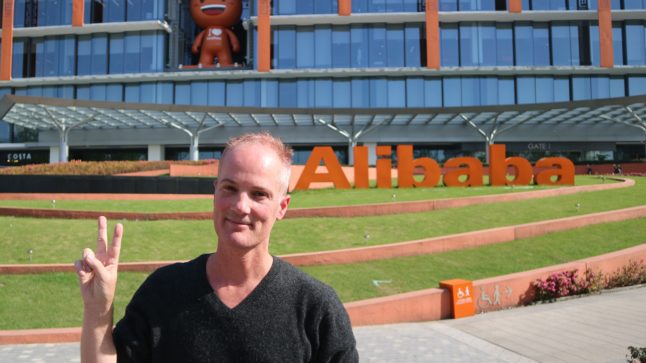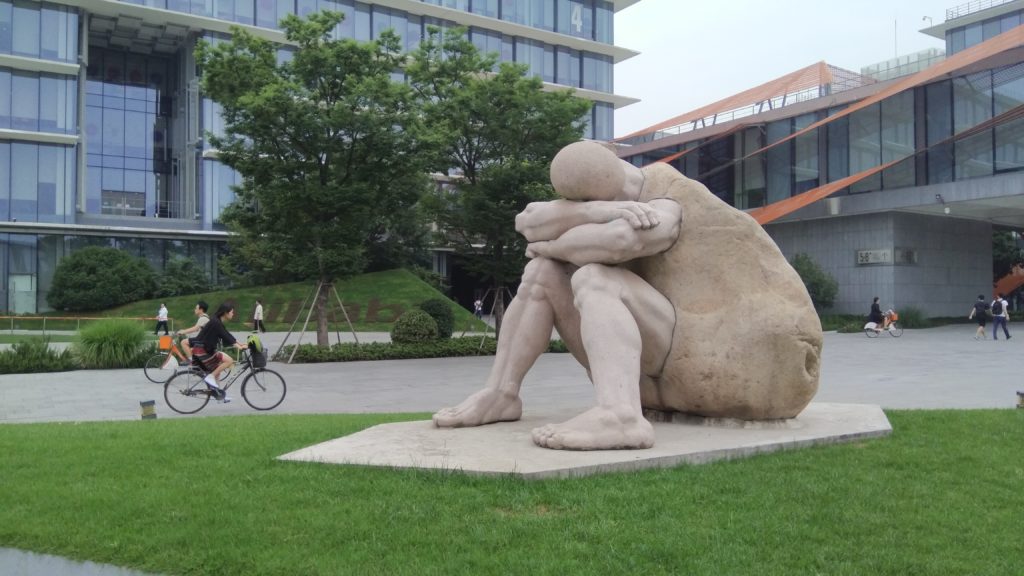It’s Tuesday afternoon and I’m touring Alibaba’s Xixi campus in Hangzhou. And it’s awesome.
The campus opened in 2013, covers 450 acres (half of which seems to be park and water) and already has +16,000 people. And they are already expanding across the street.
At first glance, Xixi campus looks a lot like the Facebook and Google campuses in Silicon Valley. It is modern and still gleaming new. And there are cool spaces for talking and meeting. Plus it has lots of nice services, like restaurants, a Starbucks, a 6,000 sq meter fitness center, and a spa. It’s the kind of a facility you build for knowledge workers that generate the highest revenues per person of just about any industry.
But as I walk around, I start to notice differences from what I would see in Silicon Valley. For example, there are interesting statues scattered throughout campus. I’m walking around with Quintus Dienst, David Clark, and Liyan Chen (more on them in a moment) and they explain that the statues represent Alibaba culture. There are statues of three tall men (called the Green Giants) walking with their heads bowed. A reminder that even though Alibaba has grown large and takes big strides, it should also remain humble and modest.
There is a statue of a team in a boat that is stuck on the rock because they are not rowing in the same direction. It’s a reminder of the need for teamwork (note: Alibaba’s six values are: customer first, teamwork, embrace change, integrity, passion & commitment.)
One statue that really catches my attention is a person sitting and holding his knees. He is thinking but also has a heavy turtle shell on his back, symbolizing the pressures of life. It is about reflecting at night on the things you have done today, and what you will do tomorrow. As Jack Ma says: today is diffcult, tomorrow is even more difficult, but the day after tomorrow will be beautiful.
We also walk by an announcement for the upcoming annual Alibaba wedding celebration, where employees who are getting married can do so on campus, a long-standing company tradition.
It’s just a really nice place. The buildings are nice and a large pond runs throughuot the campus. Designer Kangu Kamu expanded the wetlands the campus was built upon to make it a nice place to walk and talk.
And in the center of campus, right on the water, there is an upgraded version of a traditional Chinese guest house. The house sort of jumps out, a stark contrast to the rest of the campus. It is a bit of traditional China in the middle of a modern technology campus. And I think it is a particularly good symbol for the company and its ambitions. Alibaba aspires to be both an international and a deeply Chinese company.
Walking around, it strikes me that I am seeing something new. A modern and increasingly international company that is deeply shaped by a culture that is mostly Chinese. The guest house is also apparently where Jack Ma has his office and where high-level guests are met. It must be fun to be a billionaire.
And all this raises some interesting questions:
- How do you combine Chinese culture and values and a leading technology company?
- What happens when you try to take that outside of China? How do you extend that culture to other countries?
- To put it more succinctly, how do you build a true Chinese multinational?
***
I’ve been thinking a lot about this last question. Building a multinational is not that difficult when it is mostly factories (i.e., Huawei) or a popular product (i.e., Coca-Cola). But internet companies are about people. There are no factories, mines, real estate or other tangible assets. All the important assets are intangible. And it is the people and the culture that creates and continually re-creates them.
Walking around, the pervasiveness of the Alibaba culture is apparent. It is in the statues, the guest house, the company history, its famous stories, the campus, and even its location in Hangzhou. Ask any question about the company or business (or life) and you will likely get an answer that starts with “well, Jack Ma says…”. There are Jack sayings for most every situation. And everyone seems to know them.
How do you take a unique and very Chinese culture international?
I put most of Alibaba’s international moves into five buckets.
- Bringing foreign brands and merchants onto the platform – which connects them with Chinese consumers. On the last Singles’ Day, over 60,000 foreign merchants participated in the event. Alibaba is effectively digitizing (and expanding) the main trade routes of the world.
- Following Chinese tourists as they increasingly go abroad. Alipay and Ant Financial are leading the charge here.
- Expanding to SE Asia. Building and/or buying platforms for Asian consumers appears to be part of their strategic goal of getting to 2B consumers. Alibaba has recently taken over Lazada – and deployed one of Jack’s first lieutenants to run it. They are building out logistics infrastructure across Asia as well.
- Buying or building platforms outside of Asia opportunistically. Alibaba appears ready to jump if the opportunity arrives but they appear to be doing this based on opportunity or strategic advantage. The recent success of Paytm in India is an example of this. It doesn’t look like it was part of a plan.
- Increasing their R&D and other the capabilities in Silicon Valley, the US and Europe.
You can see international deals and moves in these five buckets in the press almost every week.
But something you don’t hear as much about are their international moves in culture and people. And that is what I am investigating on campus, where I am visiting their new leadership academy.
The Alibaba Global Leadership Academy is a new initiative that brings a select group of foreign professionals to live and work in Hangzhou for a year. And to be trained in the Alibaba-way. I’m on campus to talk with some of this year’s students. And I think it is an important part of this question of how you build a true Chinese multinational.
In Part 2, I will go into detail about the Leadership Academy and the experiences of some of this year’s students. But the short version is it’s an awesome program and they’re a pretty amazing group.
Thanks for reading, Jeff
- Part 2: “The Alibaba Global Leadership Academy is Awesome. You Should Apply, Like Right Now.”
- Final Thoughts on My Visit to the Alibaba Global Leadership Academy (Pt 3 of 3)
A special thanks to Quintus Dienst, one of this year’s students at the leadership academy, for the invitation.
———
I am a consultant and keynote speaker on how to increase digital growth and strengthen digital AI moats.
I am the founder of TechMoat Consulting, a consulting firm specialized in how to increase digital growth and strengthen digital AI moats. Get in touch here.
I write about digital growth and digital AI strategy. With 3 best selling books and +2.9M followers on LinkedIn. You can read my writing at the free email below.
Or read my Moats and Marathons book series, a framework for building and measuring competitive advantages in digital businesses.
Note: This content (articles, podcasts, website info) is not investment advice. The information and opinions from me and any guests may be incorrect. The numbers and information may be wrong. The views expressed may no longer be relevant or accurate. Investing is risky. Do your own research.

Photos by Jeff. Photo of campus and turtle courtesy of Alibaba





